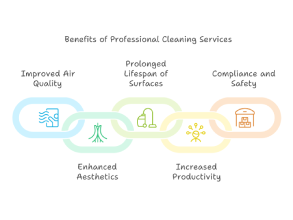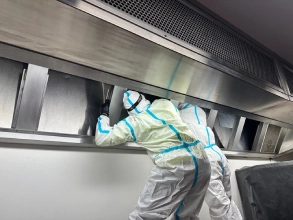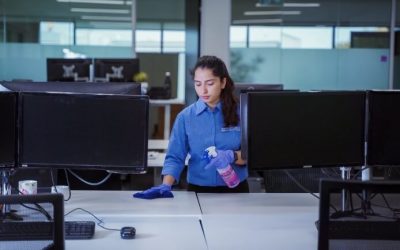New Cleaning Guidelines for Strata Buildings
The recent health pandemic has had a huge impact on cleaning practices and protocols for all types of premises and properties, particularly for strata living. Apartment buildings and shared living space pose the potential risk of an infected resident spreading the virus to other occupants, so it is particularly important for Body Corporates, Committees and Building Managers to manage the health and safety of a strata property. To do this they need to consider the Australian Government Department of Health Cleaning guidelines and update their cleaning plans accordingly. This process includes ensuring their cleaning contractors are following best practice disinfection methods to prevent the spread of COVID-19 and other viral respiratory illnesses in strata properties.
Current scientific evidence has shown that COVID-19 (SARS-CoV-2) may remain viable for up to 3 days on certain types of surfaces and materials. A study conducted by the Centre for Disease Control Prevention published on March 17, 2020, in the New England Journal of Medicine, found that aerosol droplets were found to be detectable on copper for up to 4 hours, on carboard for up to 24hrs, and for as much as 3 to 4 days on plastic and stainless steel. The research also showed that by it is possible to contract the virus by touching a surface or object with the virus on it, and then touching the face. The findings emphasize the importance of hand washing and disinfecting frequently touched surfaces and objects to protect against the spread of infection.
Cleaning and Disinfecting
Cleaning refers to the removal of germs, dirt, and impurities from surfaces. Cleaning does not kill germs, it removes them and decreases their ability to breed and the risk of spreading infection. Disinfecting refers to using chemicals that kill germs on surfaces. Killing germs on a surface after cleaning further lowers the risk of infection spreading. Cleaning should be done with a detergent solution. The type of cleaning products used depend to on the material being cleaned. To disinfect surfaces, a disinfectant that contains a concentration of bleach to kill germs must be used.
How have Strata building cleaning guidelines changed due to the Covid-19 Pandemic?
The length of time that the Covid-19 virus can last on surfaces and objects means it is good practice to frequently clean common areas with a detergent solution which has disinfecting properties. Frequently touched surfaces include:
- Door handles (front entrances, storage lockers, service or equipment rooms)
- Light switches
- Balustrades and railings
- Intercom Systems
- Elevator buttons, internal railings
- Mailboxes
- Laundry rooms, communal washing machines, dryers, taps & sinks
- Garbage areas (chutes, door handles, rubbish bin handles)
- Common area bathrooms, toilets, taps, sinks and sanitary or nappy disposal bins
- Doors and surfaces such as tables, chairs, benches in the BBQ or entertainment area, for example
Minimally touched surfaces such as floors, walls, windows, should also be cleaned more often during a health crisis, especially if there are young children in the building as they are likely to touch floors and walls.
Hand Hygiene
Hand cleaning and hygiene practices are crucially important to preventing the spread of the virus. The COVID-19 virus is encased in fat-like layer. Soap helps to break down that fatty layer leaving the virus unable to infect you and the hand-washing process washes the virus away. To keep building occupants safe, it is a good idea to provide hand sanitisers (that contains at least 60% alcohol) and disinfectant wipes in common areas. A good cleaning contractor should be able to supply these as well as checking them and keeping them well stocked with sanitiser. It is important to make sure bins are regularly emptied and cleaned, and it may be necessary to increase the frequency of rubbish removal where residents are working from home or lockdown restrictions are in place.
Owners Corporations and Body Corporates obligations
Owners Corporations and Body Corporates have an obligation to maintain common areas to a standard that is safe for occupants. Committees and Building Managers have a responsibility to review the building cleaning plans and check that their cleaning contractors have implemented relevant Covid-19 practices. This includes requesting your contractor to provide details about changes they have made to upgrade their service such as:
- Covid-19 Cleaning Plan – this should outline specific protocols for cleaning staff relating to social distancing, increased frequency of cleans, type of cleaning and disinfecting products used, specific tasks eg. focus on high touch surfaces and frequently used areas
- Safe Work Method Statement – check it includes additional processes relating to Personal Protection Equipment (PPE), social distancing measures, and cleaning equipment before and after it is used on site
- Wearing masks and displaying signs when cleaning common areas – staff regularly sanitising hands, disinfecting door handles and other surfaces after they have completed work, and bringing their own pens if signing log books etc
Cleaning frequencies will need to be increased to manage disinfection of high-touch surfaces particularly in larger complexes. Rubbish removal services may also need to be stepped up, as more residents work from home and during lockdown periods. Ventilator systems and air conditioning vents should be regularly cleaned. There may also be increased pressure on plumbing and air conditioning requiring increased maintenance and service calls.
Closure of shared facilities – Gyms, Swimming Pools, BBQ & Entertainment Areas
Owners Corporations and Body Corporates are responsible for protecting the health and safety of building occupants and must make the necessary decisions to benefit owners and residents. Closing pools and other indoor facilities such as gyms and shared BBQ areas until the virus is under control may be a necessary step to take to protect the health and safety of all of the occupants. Although there is currently no explicit regulations under strata laws regarding common property during COVID-19, there are some important issues to consider. Managing safe social distancing of residents and visitors in shared facilities would be difficult and largely impractical. Cleaning regimens to properly protect these areas would also be prohibitive and costly. The financial ramifications are considerable and the Body Corporate may choose to close shared facilities to minimise the risk of a negligence claim should an infection occur. Ultimately, the closure of these areas is for the safety of residents and the community and is likely to only be in place for a relatively short time.
Owners Corporations and Committees should consult their strata lawyer, strata managing agent, and public health professionals when making these decisions. The responsibility for keeping residents and the community safe rests with all of us. Practice common sense, be a good neighbour, wash your hands and, where possible, assist those who need assistance. White Spot Group has teams highly experienced and trained in all strata building cleaning, maintenance, and care-taking services. For an obligation free consultation and quote for all your strata building cleaning and facility management needs call now 1300 797 632



